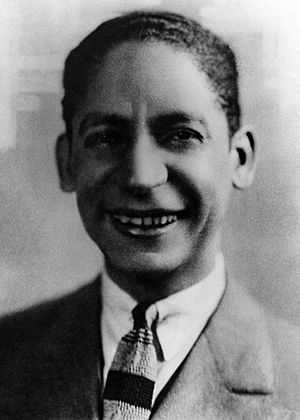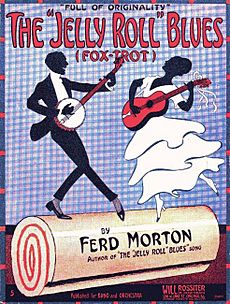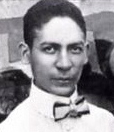Jelly Roll Morton facts for kids
Quick facts for kids Jelly Roll Morton |
|
|---|---|

Morton c. 1927
|
|
| Background information | |
| Birth name | Ferdinand Joseph LaMothe |
| Born | c. September 20, 1890 New Orleans, Louisiana, U.S. |
| Died | July 10, 1941 (aged 50) Los Angeles, California, U.S. |
| Genres | |
| Occupation(s) |
|
| Instruments | Piano |
| Years active | 1904–1941 |
| Labels |
|
Ferdinand Joseph LaMothe (born around September 20, 1890 – died July 10, 1941), known as Jelly Roll Morton, was an American jazz and blues pianist. He was also a bandleader and composer. Morton came from a Louisiana Creole background.
Many consider Morton to be jazz's first arranger. He showed that jazz, which often involved improvisation, could also be written down. His song "Jelly Roll Blues", published in 1915, was one of the first jazz compositions ever printed. He also believed he was the inventor of jazz music.
Morton wrote other famous songs like "King Porter Stomp", "Wolverine Blues", and "Black Bottom Stomp". He also created "I Thought I Heard Buddy Bolden Say". This song honored early New Orleans musicians. Some people have questioned his claim of inventing jazz in 1902. However, his important contributions to early jazz are widely recognized.
Contents
Biography
Early Life
Ferdinand Joseph LaMothe was born in New Orleans, Louisiana. This was around 1890, in the Faubourg Marigny neighborhood. He was part of the Creole community. His parents were Martin-Edouard Joseph Lamothe and Louise Hermance Monette. His father was a bricklayer and sometimes played the trombone. His mother worked in homes.
When Ferdinand was about three years old, his father left. In 1894, his mother married William Mouton. Ferdinand then took his stepfather's last name, changing it to Morton. He also started using "Ferd" as a short name.
Musical Journey
Around age fourteen, Morton began playing piano in public places. He used the nickname "Jelly Roll."
Around 1904, Morton started traveling across the US South. He performed in minstrel shows like Will Benbow's Chocolate Drops. During this time, he composed many songs. These included "Jelly Roll Blues", "New Orleans Blues", and "King Porter Stomp". Other famous pianists saw him play in Chicago and New York City.
From 1912 to 1914, Morton toured with his girlfriend, Rosa Brown. They performed in vaudeville shows. By 1914, he began writing down his music. In 1915, "Jelly Roll Blues" became one of the first jazz songs ever published. In 1917, he moved to California with bandleader William Manuel Johnson. Morton's tango song "The Crave" became popular in Hollywood. He also performed in Vancouver, Canada.
Morton returned to Chicago in 1923. He wanted to make sure he received credit for his song "The Wolverines." This song was also known as "Wolverine Blues." He then made his first commercial recordings. He recorded as a solo pianist and with jazz bands.
In 1926, Morton signed a contract with the Victor Talking Machine Company. This allowed him to record with his band, Jelly Roll Morton and His Red Hot Peppers. Famous musicians like Kid Ory and Omer Simeon played in these recordings.
Morton later moved to New York City. He continued to record for Victor. It was sometimes hard to find musicians who played his style of jazz. Despite this, he recorded with many talented artists. However, his New York recordings did not become big hits.
The Great Depression made things difficult for many musicians. RCA Victor did not renew Morton's recording contract in 1931. He kept playing in New York but faced financial struggles. In 1934, he had a short radio show. He then toured with a burlesque band. In 1935, his song "King Porter Stomp" became a huge hit for Benny Goodman. This was thanks to an arrangement by Fletcher Henderson. It became a popular swing standard. However, Morton did not receive money from these recordings.
Library of Congress Recordings
In 1935, Morton moved to Washington, D.C. He managed and played piano at a bar called the Music Box. In May 1938, a folklorist named Alan Lomax heard him play. Lomax invited Morton to record music and interviews for the Library of Congress.
These recording sessions were meant to be short. But Morton had so much to share that they lasted over eight hours. He talked about his life and played the piano. Lomax was especially interested in Morton's early days in New Orleans. He also wanted to record songs that were popular back then. Some of these songs had themes for adults. Morton recorded them, but they were not released until 2005.
In these interviews, Morton said he was born in 1885. Some historians believe he might have said this to support his claim of inventing jazz. However, Morton might not have known his exact birthdate. He also said Buddy Bolden played ragtime, not jazz. This view is debated by other musicians from New Orleans.
Later Years and Passing
In 1938, Morton was injured in a fight. He suffered wounds to his head and chest. Due to the unfair laws of racial segregation at the time, a nearby hospital would not treat him. He had to be taken to another hospital further away. Doctors at this hospital were slow to treat his injuries. His recovery was not complete, and he often felt ill afterward. His wife, Mabel, insisted they leave Washington.
Morton's health continued to decline. He suffered from worsening asthma. He traveled to Los Angeles hoping to restart his career. He passed away on July 10, 1941. He was generally believed to be 50 years old. Some jazz historians say that few musicians attended his funeral. This was because his strong personality had upset some people.
An article in DownBeat magazine reported on his funeral. It mentioned that Kid Ory and Mutt Carey were among his pallbearers. Mercer Ellington, son of Duke Ellington, also attended.
Personal Life
Morton married Mabel Bertrand, a showgirl, in November 1928. Their wedding took place in Gary, Indiana.
He was a very devoted Catholic. His longtime companion, Anita Gonzales, confirmed this. His grave has a large Rosary instead of musical symbols.
His Music Style and Compositions
Morton's piano style was unique. It came from early ragtime music. His playing was also similar to barrelhouse piano, which led to boogie-woogie.
Morton often played the main tune with his right thumb. He would add harmonies above these notes with his other fingers. This created a special sound often linked to New Orleans music. He also used different bass patterns in his left hand. He played basic swing rhythms with both hands.
Many of Morton's songs honored himself. These included "Winin' Boy" and "The Jelly Roll Blues." His song "King Porter Stomp" became a huge hit for Fletcher Henderson and Benny Goodman. It was a standard song for many swing bands. Morton also claimed to have written other popular tunes. These included "Alabama Bound" and "Tiger Rag". His song "Sweet Peter" (1926) seems to be the source for the melody of "All of Me."
Morton's musical influence continues today. You can hear it in the work of musicians like Dick Hyman.
Lasting Impact
In 2013, Katy Martin wrote an article about Morton. She argued that Alan Lomax's book made Morton seem like an egotist. Martin believed this was not true. She pointed out that Morton himself felt he was not as fast as other musicians. He said he created his own style by using slower tempos. This allowed for more notes and a "pinch of Spanish" flavor.
Awards and Recognition
- The Library of Congress interviews were released after his death. This boxed set won two Grammy Awards.
- In the same year, Morton received the Grammy Lifetime Achievement Award.
- Morton was nominated for a Tony Award for Best Original Score in 1992. This was for Jelly's Last Jam, a musical about his life.
- He was inducted into the Rock and Roll Hall of Fame. He was also a charter member of the Gennett Records Walk of Fame.
- In 2008, he was inducted into the Louisiana Music Hall of Fame.
Discography
- 1923–24 - 1923/24 (Milestone, 1974)
- 1926–27 - Birth Of The Hot - The Classic Chicago "Red Hot Peppers" Sessions (1926-1927) (RCA Bluebird, 1985)
- 1926–1928 - The Pearls (RCA Bluebird, 1988)
- 1926–28 - Jazz King of New Orleans (RCA Bluebird, 1961)
- 1939–40 - Jelly Roll Morton: The Complete Library of Congress Recordings, Vols. 1–8 (8-CD Box Set) (Rounder, 2005)
Jelly Roll Morton in Books and Movies
- Jelly Roll Morton's Last Night at the Jungle Inn: An Imaginary Memoir (1984) is a book by Samuel Charters. It tells stories about Morton's early life.
- In his 1970 album Moondance, Van Morrison sings "And it stoned me to my soul, stoned me just like Jelly Roll." This refers to listening to his father's Morton recordings as a child.
- Clarence Williams III played Jelly Roll Morton in the movie The Legend of 1900.
- Jelly's Last Jam is a musical about Morton's life. It features music by Jelly Roll Morton and Luther Henderson.
- In the TV series AMC's Interview with the Vampire, Morton is shown performing in New Orleans around 1917.
See also
 In Spanish: Jelly Roll Morton para niños
In Spanish: Jelly Roll Morton para niños
- List of ragtime composers
 | Jessica Watkins |
 | Robert Henry Lawrence Jr. |
 | Mae Jemison |
 | Sian Proctor |
 | Guion Bluford |



